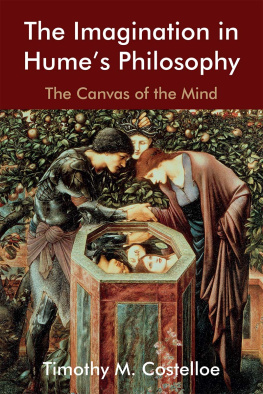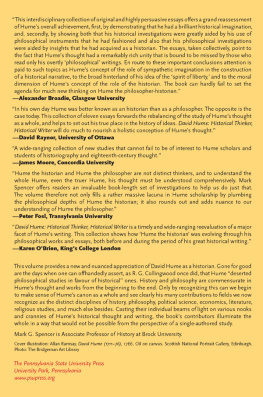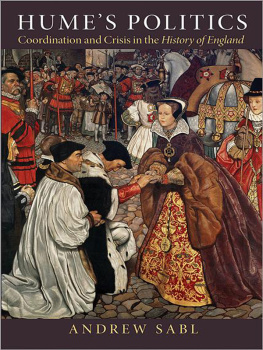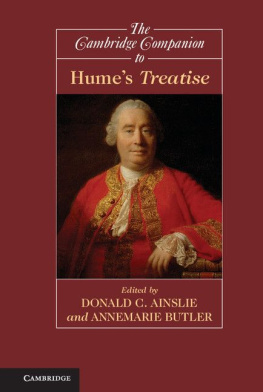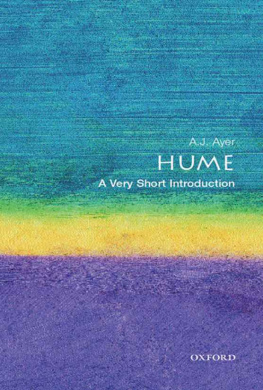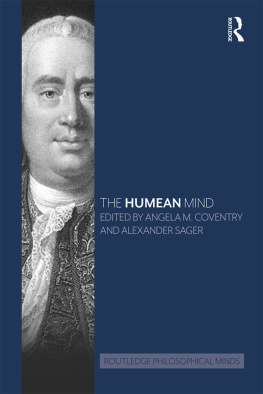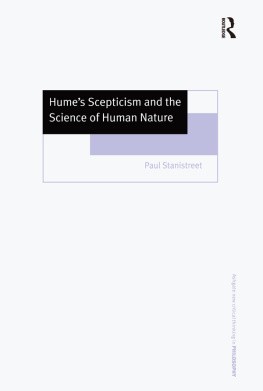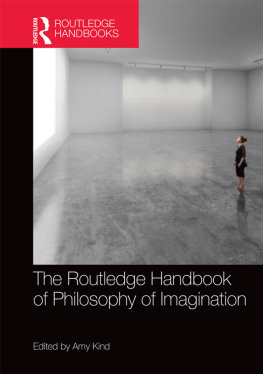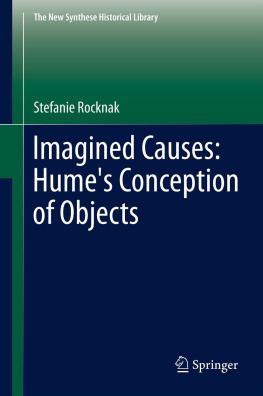
The Imagination in Humes Philosophy
Edinburgh Studies in Scottish Philosophy
Series Editor: Gordon Graham
Center for the Study of Scottish Philosophy, Princeton Theological Seminary
Scottish Philosophy Through the Ages
This new series will cover the full range of Scottish philosophy over five centuries from the medieval period through the Reformation and Enlightenment periods, to the nineteenth and early twentieth centuries.
The series will publish innovative studies on major figures and themes. It also aims to stimulate new work in less intensively studied areas, by a new generation of philosophers and intellectual historians. The books will combine historical sensitivity and philosophical substance which will serve to cast new light on the rich intellectual inheritance of Scottish philosophy.
Editorial Advisory Board
Angela Coventry, University of Portland, Oregon
Fonna Forman, University of San Diego
Alison McIntyre, Wellesley College
Alexander Broadie, University of Glasgow
Remy Debes, University of Memphis
John Haldane, University of St Andrews and Baylor University, Texas
Books available
Adam Smith and Rousseau: Ethics, Politics, Economics edited by Maria Pia Paganelli, Dennis C. Rasmussen and Craig Smith
Thomas Reid and the Problem of Secondary Qualities by Christopher A. Shrock
Humes Sceptical Enlightenment by Ryu Susato
The Imagination in Humes Philosophy: The Canvas of the Mind by Timothy M. Costelloe
Books forthcoming
Adam Ferguson and the Idea of Civil Society: Moral Science in the Scottish Enlightenment by Craig Smith
Essays on Hume, Smith and the Scottish Enlightenment by Christopher Berry
Eighteenth-Century Scottish Aesthetics: Not Just a Matter of Taste by Rachel Zuckert
www.edinburghuniversitypress.com/series/essp
The Imagination in Humes Philosophy
The Canvas of the Mind
Timothy M. Costelloe

For Amy, whose fancy sometimes roams
Edinburgh University Press is one of the leading university presses in the UK. We publish academic books and journals in our selected subject areas across the humanities and social sciences, combining cutting-edge scholarship with high editorial and production values to produce academic works of lasting importance. For more information visit our website: edinburghuniversitypress.com
Timothy M. Costelloe, 2018
Edinburgh University Press Ltd
The Tun Holyrood Road
12(2f) Jacksons Entry
Edinburgh EH8 8PJ
A CIP record for this book is available from the British Library
ISBN 978 1 4744 3642 7
The right of Timothy M. Costelloe to be identified as the author of this work has been asserted in accordance with the Copyright, Designs and Patents Act 1988, and the Copyright and Related Rights Regulations 2003 (SI No. 2498).
Contents
Acknowledgements
This book has been a long time in the writing. The ideas at the heart of it were first aired, in rudimentary and tentative form, at a colloquium in the Department of Philosophy at the College of William & Mary in the autumn of 2005, and presented later in St Andrews, Scotland, in the summer of 2007 as part of an NEH seminar, Aesthetics of the Scottish Enlightenment and Beyond, organised by Paul Guyer and Rachel Zuckert; they also received an initial formulation in a published article (Humes Phenomenology of the Imagination, Journal of Scottish Philosophy, 5: 1 (2007), pp. 3145). I would like to thank both Miriam McCormick, who responded to the paper at William & Mary, and the general audiences on both occasions for their thoughtful questions and useful comments. I first wrote portions of the book while an Alexander von Humboldt Research Fellow in the Department der Philosophie at Maximilians-Universitt Mnchen in 2006 and as a visiting scholar at Northwestern University in 20089. My thanks to Gnter Zller in Munich and Rachel Zuckert in Evanston for helping to arrange my visits and for being such gracious hosts, and to the Humboldt Stiftung for their financial and institutional support. I am grateful to the College of William & Mary for releasing me from my usual teaching and administrative duties so that I might take up the Humboldt Fellowship, and for their support in the form of scheduled semester research leaves both in 20089, when I visited Northwestern, and again in 201516, under the aegis of which I was able largely to complete my work on the manuscript. The criticisms, comments and suggestions of the anonymous reviewers who read the manuscript have proved invaluable. Not only did they save me from committing a number of embarrassing errors, but their remarks also enabled me to make many improvements, both large and small, to the book as a whole. Any remaining errors, embarrassing or otherwise, are my responsibility alone.
Some of the material in has appeared in contributions I made to two collections of papers on Hume: Fact and Fiction: Memory and Imagination in Humes Approach to History and Literature, in Mark G. Spencer (ed.), David Hume: Historical Thinker, Historical Writer (University Park, Pennsylvania: The Pennsylvania State University Press, 2013), pp. 18199, and Hume as Historian, in Alan Bailey and Dan OBrien (eds), The Continuum Companion to Hume (London: Continuum Publishing, 2012), pp. 36476. I would like to thank Bloomsbury Continuum, an imprint of Bloomsbury Publishing, and The Pennsylvania State University Press for permission to reproduce the relevant material.
Preface
There is scarcely any subject broached by David Hume in the course of his philosophical writings that is not touched in some way by the faculty he calls the imagination and the principles that he takes to govern it. The imagination makes its appearance early in the Treatise, when Hume is expounding his theory of ideas, and remains his constant companion to the last, where, in a final act of recognition, he acknowledges that all his anatomical labours might be for naught should the hideous details he has uncovered not be smoothed over and made engaging to the eye and the imagination. It falls to the painter that master of representation, trader in images and purveyor of effect to set [objects] more at a distance by shifting the focus of the philosophical eye from the minute views of things to one of general outlines and surfaces across which eye and imagination might move more easily (T 3.3.6.6/SBN 621). In the reflections that make up his Appendix, moreover, recognition turns to capitulation: here, Hume admits defeat in rendering intelligible the mysteries of self and substance, ideas in which the intrigues of the imagination are so deeply implicated that even Humes considerable genius (or so he claims) cannot root them out. He pleads the privilege of a sceptic in the face of a difficulty... too hard for [his] understanding (T. App.21/SBN 636). One is reminded here of Humes memorable battle earlier with the demon of total scepticism at the end of Book 1, with the philosopher, in the famous image, on his weather-beaten vessel heading into the immense depths of philosophy with only the strangest and most unexpected of bedfellows for company: the imagination, the bottom upon which Humes line (to borrow from John Lockes earlier nautical metaphor) sounds. The imagination provides Hume with the fundamental principle upon which philosophy and common life rest (the quality, seemingly so trivial, through which the mind enlivens some ideas beyond others [T 1.4.7.3/SBN 265]), and offers the sole hope of escaping his apparently crippling doubts (we are saved from total scepticism only by a singular and seemingly trivial property of the fancy [1.4.7.7/SBN 268]).
Next page
